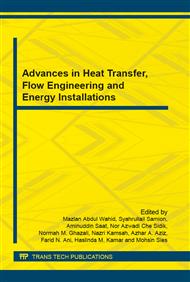p.117
p.122
p.127
p.132
p.142
p.147
p.152
p.160
p.171
Investigation on Potential Working Fluids for Waste Heat Recovery Applications
Abstract:
Since topics like the greenhouse effect and the associated global warming issue are much more discussed in the past, automobile manufacturers have to become even more active in in two fields: reduction of fuel consumption and reduction of emissions. As the optimization of motor vehicles has reached a point at which significant additional fuel saving cannot be achieved by means of purely engine-internal measures alone, other systems must be found to improve the specific fuel consumption. One promising technology could be the use of engine waste heat contained in exhaust gas. Earlier studies have shown, besides systems like thermoelectric generators or a Turbo compounding system, an integrated Rankine Cycle offers a lot of potential to turn waste heat into mechanical or electrical power. The use of a suitable working fluid for this Rankine Cycle is required to achieve a maximum in system power output. The aim of this work is to investigate the suitability of working fluids for automotive Organic Rankine Cycle applications. The investigation is focused on the thermodynamic simulation on the one hand and the experimental evaluation of thermal stability of the fluids on the other hand. For the experimental evaluation of the stability a continuous cycle is used to achieve nearly equal process conditions. The stability tests start with a short time screening of all selected fluids, later on the most promising ones are tested in long time test runs. In the test runs, the substances of the categories alkanes, cycloalkanes, monoaromatics and fluorinated compounds show best results regarding stability. In contrast acetales, siloxanes and ethers are not stable under the selected conditions. The same applies to ethanol. With a temperature above 225 °C ethanol is not stable. Additional runs with ethanol show that the temperature has to be limited to below 250 °C at least to avoid a high decomposition. Also acetone reacting products can be found in the liquid phase leading to high boiling substances that then may lead to coke formation in the system. The validation of the tested and simulated fluids is done for two different condensation temperatures (CT) of 100°C and 40°C. Fluids acetone and ethanol (CT 100°C) show best overall results. In Addition fluids n-hexane, methylcyclohexane, cyclohexane and toluene show good upto very good results. For condensation temperature 40°C, cyclopentane and R1233zd is suggested.
Info:
Periodical:
Pages:
142-146
DOI:
Citation:
Online since:
January 2016
Authors:
Keywords:
Price:
Сopyright:
© 2016 Trans Tech Publications Ltd. All Rights Reserved
Share:
Citation:


